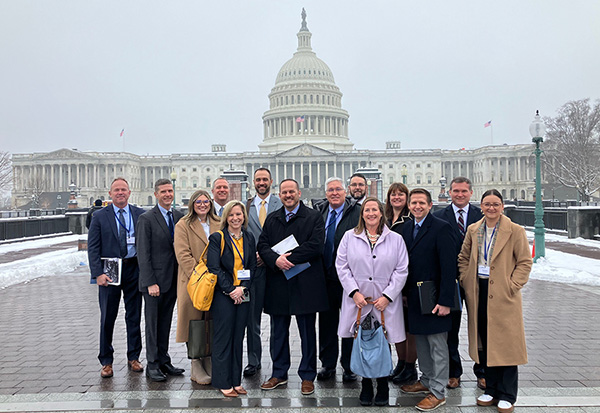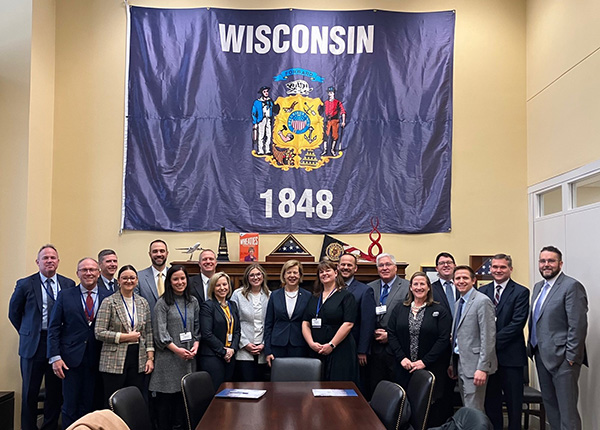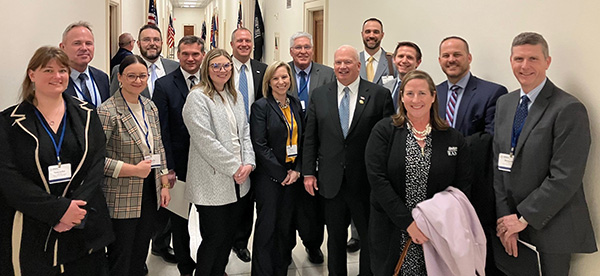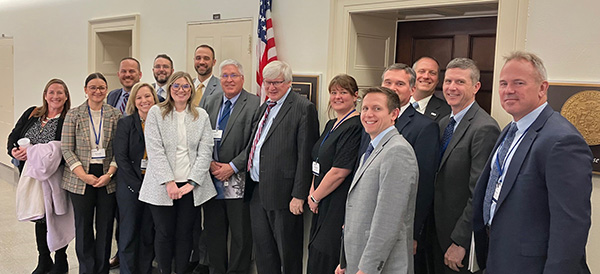Click here to view past issues
IN THIS ISSUE
- WHA Joins RWHC in Washington, DC
- Grassroots Spotlight: Congressman Steil Tours Beloit Memorial Hospital and Attends WHA Roundtable Discussion
- GUEST COLUMN: Compliance FYI: DOL Clarifies PFML & FMLA Paid Leave Rules
- Register Today: Cybersecurity Risks in Rural Health Care Webinar
- Expert Clinical Guidance for Challenging Addiction Cases
EDUCATION EVENTS
Feb. 25, 2026
2026 Advocacy DayMar. 4, 2026
Spring 2026 Annual Survey TrainingMar. 5, 2026
Operational Vacancy: An Effective Tool for Workforce PlanningClick here to view education event calendar
View more issues of The Valued Voice
Sign Up for WHA's Newsletter
WHA Joins RWHC in Washington, DC
On Feb. 12, WHA joined the Rural Wisconsin Health Cooperative (RWHC) with a group of more than a dozen rural hospital and health care leaders to urge Wisconsin’s Congressional leaders on Capitol Hill to support Wisconsin’s rural health care priorities.
 WHA and RWHC with rural hospital and health care leaders in Washington, DC Feb. 12.
WHA and RWHC with rural hospital and health care leaders in Washington, DC Feb. 12.
Joining the group were:
- Brian Stephens, President and CEO, Door County Medical Center
- Bob Van Meeteren, President and CEO, Reedsburg Area Medical Center
- Chris Brophy, CEO of Crossing Rivers Health Medical Center, Prairie du Chien
- Chris Brabant, President & CEO, Stoughton Health
- Emily Dilley, CEO, Cumberland Health
- Ellen Thompson, Chief Operating Officer, Western Wisconsin Health
- Mike Schafer, CEO, Spooner Health
- Dr. Michelle Clark-Forsting MD, Chief Physician Executive, Black River Health
- Bryan Weichelt, Associate Research Scientist, Marshfield Clinic Research Institute
- Samantha Peck, Rural Hospitals & Clinics Program Manager, Wisconsin Office of Rural Health
- Jim Wilson, Chief Financial Officer, Mayo Clinic Health System
- Leighanna Comstock, Federal Government Relations Manager, Mayo Clinic Health System
- Katy Prange, Outreach Coordinator, Reedsburg Area Medical Center
- Brad Wolters, Director of Federal Government Relations, Marshfield Clinic Health System
- Jeremy Levin, Director of Advocacy, RWHC
- Jon Hoelter, Vice President of Federal and State Relations, WHA
 Hospital and health system leaders with Sen. Tammy Baldwin (center).
Hospital and health system leaders with Sen. Tammy Baldwin (center).
The group of hospital leaders advocated for a variety of important federal health care priorities, including protecting and strengthening the 340B discount drug program. Last session, a group of bipartisan U.S. senators including Wisconsin Sen. Tammy Baldwin introduced a discussion draft of legislation designed to give the Health Resources and Services Administration (HRSA) explicit statutory authority to enforce the requirement that drug companies provide discounts at contract pharmacies and prevent pharmacy benefit managers from pocketing the savings intended for 340B entities. In exchange for these protections, 340B entities would be required to submit additional information. The group urged support for Congress quickly by re-introducing this legislation in 2025.
 Hospital and health system leaders with Rep. Scott Fitzgerald in Washington, DC.
Hospital and health system leaders with Rep. Scott Fitzgerald in Washington, DC.
The rural health care leaders also reminded Wisconsin's Congressional Delegation of the need to extend vital health care programs scheduled to expire at the end of March 2025, including:
- Telehealth waivers - Prior to the COVID-19 pandemic, Medicare did not reimburse for telehealth delivered to a patient's home. The patient was required to be seen at a health care facility, and even then, Medicare would only reimburse if that facility was in a rural, health professional shortage area. Without an extension of these waivers, Medicare would revert to that policy.
- Hospital at Home - CMS authorized the Acute Hospital Care at Home program to expand access to care during the COVID-19 pandemic. The program allows people with low acuity conditions to receive a hospital level of care equivalent to an inpatient stay in the comfort of their own home along with daily visits by nurses and telehealth visits from physicians. It has been an important tool for hospitals to increase capacity given the continued challenges of finding post-acute care placements which are continuing to create bottlenecks in the health care system.
- Medicare-Dependent (MDH) and Low-Volume Adjustment Hospitals (LVH) - Wisconsin has approximately 16 "tweener" hospitals that are too large to be considered critical access hospitals but also too small to have the volumes necessary to offset Medicare and Medicaid losses. These MDH and LVH hospitals receive slightly enhanced Medicare reimbursement rates to help offset their Medicare losses. Losing these programs would amount to nearly $230 million in cuts to these hospitals over the next ten years.
Lastly, the group urged members of Wisconsin's Congressional delegation to stand up for Wisconsin as proposals come before them to look for federal savings in the Medicaid and Medicare programs. Last week, the House Budget Committee approved a budget resolution that would direct the House Energy & Commerce Committee to find $880 billion in savings (largely expected to come from Medicaid and Medicare) to help pass a budget reconciliation package to extend the expiring provisions of the Tax Cuts and Jobs Act. The group of rural hospital and health care leaders expressed concerns that a number of these provisions could lead to cuts to hospitals that would impact services available to Medicaid and Medicare beneficiaries.
 Hospital and Health System Leaders with Rep. Glenn Grothman (center) in Washington, DCWHA will continue to educate our federal lawmakers on how various proposals could impact Wisconsin's Medicaid program and Wisconsin's hospitals and health systems as various spending packages progress. Contact WHA’s Jon Hoelter with questions.
Hospital and Health System Leaders with Rep. Glenn Grothman (center) in Washington, DCWHA will continue to educate our federal lawmakers on how various proposals could impact Wisconsin's Medicaid program and Wisconsin's hospitals and health systems as various spending packages progress. Contact WHA’s Jon Hoelter with questions.
WHA Joins RWHC in Washington, DC
On Feb. 12, WHA joined the Rural Wisconsin Health Cooperative (RWHC) with a group of more than a dozen rural hospital and health care leaders to urge Wisconsin’s Congressional leaders on Capitol Hill to support Wisconsin’s rural health care priorities.
 WHA and RWHC with rural hospital and health care leaders in Washington, DC Feb. 12.
WHA and RWHC with rural hospital and health care leaders in Washington, DC Feb. 12.
Joining the group were:
- Brian Stephens, President and CEO, Door County Medical Center
- Bob Van Meeteren, President and CEO, Reedsburg Area Medical Center
- Chris Brophy, CEO of Crossing Rivers Health Medical Center, Prairie du Chien
- Chris Brabant, President & CEO, Stoughton Health
- Emily Dilley, CEO, Cumberland Health
- Ellen Thompson, Chief Operating Officer, Western Wisconsin Health
- Mike Schafer, CEO, Spooner Health
- Dr. Michelle Clark-Forsting MD, Chief Physician Executive, Black River Health
- Bryan Weichelt, Associate Research Scientist, Marshfield Clinic Research Institute
- Samantha Peck, Rural Hospitals & Clinics Program Manager, Wisconsin Office of Rural Health
- Jim Wilson, Chief Financial Officer, Mayo Clinic Health System
- Leighanna Comstock, Federal Government Relations Manager, Mayo Clinic Health System
- Katy Prange, Outreach Coordinator, Reedsburg Area Medical Center
- Brad Wolters, Director of Federal Government Relations, Marshfield Clinic Health System
- Jeremy Levin, Director of Advocacy, RWHC
- Jon Hoelter, Vice President of Federal and State Relations, WHA
 Hospital and health system leaders with Sen. Tammy Baldwin (center).
Hospital and health system leaders with Sen. Tammy Baldwin (center).
The group of hospital leaders advocated for a variety of important federal health care priorities, including protecting and strengthening the 340B discount drug program. Last session, a group of bipartisan U.S. senators including Wisconsin Sen. Tammy Baldwin introduced a discussion draft of legislation designed to give the Health Resources and Services Administration (HRSA) explicit statutory authority to enforce the requirement that drug companies provide discounts at contract pharmacies and prevent pharmacy benefit managers from pocketing the savings intended for 340B entities. In exchange for these protections, 340B entities would be required to submit additional information. The group urged support for Congress quickly by re-introducing this legislation in 2025.
 Hospital and health system leaders with Rep. Scott Fitzgerald in Washington, DC.
Hospital and health system leaders with Rep. Scott Fitzgerald in Washington, DC.
The rural health care leaders also reminded Wisconsin's Congressional Delegation of the need to extend vital health care programs scheduled to expire at the end of March 2025, including:
- Telehealth waivers - Prior to the COVID-19 pandemic, Medicare did not reimburse for telehealth delivered to a patient's home. The patient was required to be seen at a health care facility, and even then, Medicare would only reimburse if that facility was in a rural, health professional shortage area. Without an extension of these waivers, Medicare would revert to that policy.
- Hospital at Home - CMS authorized the Acute Hospital Care at Home program to expand access to care during the COVID-19 pandemic. The program allows people with low acuity conditions to receive a hospital level of care equivalent to an inpatient stay in the comfort of their own home along with daily visits by nurses and telehealth visits from physicians. It has been an important tool for hospitals to increase capacity given the continued challenges of finding post-acute care placements which are continuing to create bottlenecks in the health care system.
- Medicare-Dependent (MDH) and Low-Volume Adjustment Hospitals (LVH) - Wisconsin has approximately 16 "tweener" hospitals that are too large to be considered critical access hospitals but also too small to have the volumes necessary to offset Medicare and Medicaid losses. These MDH and LVH hospitals receive slightly enhanced Medicare reimbursement rates to help offset their Medicare losses. Losing these programs would amount to nearly $230 million in cuts to these hospitals over the next ten years.
Lastly, the group urged members of Wisconsin's Congressional delegation to stand up for Wisconsin as proposals come before them to look for federal savings in the Medicaid and Medicare programs. Last week, the House Budget Committee approved a budget resolution that would direct the House Energy & Commerce Committee to find $880 billion in savings (largely expected to come from Medicaid and Medicare) to help pass a budget reconciliation package to extend the expiring provisions of the Tax Cuts and Jobs Act. The group of rural hospital and health care leaders expressed concerns that a number of these provisions could lead to cuts to hospitals that would impact services available to Medicaid and Medicare beneficiaries.
 Hospital and Health System Leaders with Rep. Glenn Grothman (center) in Washington, DCWHA will continue to educate our federal lawmakers on how various proposals could impact Wisconsin's Medicaid program and Wisconsin's hospitals and health systems as various spending packages progress. Contact WHA’s Jon Hoelter with questions.
Hospital and Health System Leaders with Rep. Glenn Grothman (center) in Washington, DCWHA will continue to educate our federal lawmakers on how various proposals could impact Wisconsin's Medicaid program and Wisconsin's hospitals and health systems as various spending packages progress. Contact WHA’s Jon Hoelter with questions.
IN THIS ISSUE
- WHA Joins RWHC in Washington, DC
- Grassroots Spotlight: Congressman Steil Tours Beloit Memorial Hospital and Attends WHA Roundtable Discussion
- GUEST COLUMN: Compliance FYI: DOL Clarifies PFML & FMLA Paid Leave Rules
- Register Today: Cybersecurity Risks in Rural Health Care Webinar
- Expert Clinical Guidance for Challenging Addiction Cases

